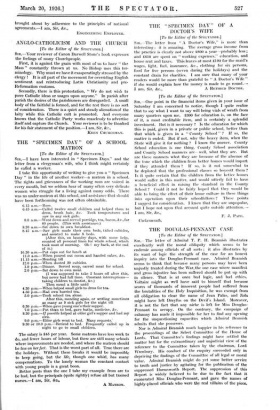THE "SPECIMEN DAY" OF A SCHOOL MATRON [To the Editor
of the SPECTATOR.]
• have been interested in " Specimen Days," and the letter from a clergyman's wife, who I think might certainly. be called a worker.
I take this opportunity of writing to give you a " Specimen Day " in the life of another worker—a matron in a school. The rights and grievances of the working man are voiced in every mouth, but we seldom hear of many often very delicate women who struggle for a living against ninny odds. There was no under-matron at this school, and assistance that should have been forthcoming was not often obtainable.
6.15 a.m.—Rose.
6.45 a.m.—Called twelve small children and helped them to dress, brush hair, &c. Took temperatures and
saw to any sick girls.
8.0 a.m.—Went down and served porridge, tea, bacon, &c.,for 60 peoplo. (This with assistance.) 8.30 a.m.—Sat down to own breakfast.
8.45 a.m.—Saw girls made their own beds, tidied cubicles, and assisted to make 8 beds.
(After this, on laundry days, with some help, counted all personal linen for whole school, which took most of morning. Oh ! my back, at the end of it.) 10.30 a.m.—Put cups out for lunch at 11.0 a.m.—When poured out cocoa and handed cakes, &c.
11.15 a.m.—Mending till 12.0 p.m.—When dusted 20 cubicles. 1.0 p.m.—Dinner. Served soup, carved meat for school. 2.0 p.m.—Sat down to own meal. (I was supposed to take 2 hours off after this,
but never had' full time. Constant interruptions—
taking children to dentist, &c.) Then mend a little until 4.30 p.m.—When helped small girls to dress for tea. 4.50 p.m.—Had own hurried tea. 5.0 p.m.—Took school tea alone. After this, mending again, or settling sometimes as many as 9 sick girls for the night till 6.30 p.m.—When gave young one's their supper.
7.0- p.m.—Put theca to bed, gave baths, medicine, &c. 8.30 p.m.—If possible helped at older girl's supper and had my
own.
9.0 p.m.—Elder girls went to bed. Many requests:
9.30 or 10.0 p.m.L—Retired to-bed: Frequently called up in
night to go to small children.
The salary is £45 per year. Some matrons have less work to do, and fewer hours of labour, but there are still many schools where improvements are needed, and where the matron should be less on her feet. That is the worst part of all. True there are the holidays. Without these breaks it would be impossible to keep going, but the life, though one whirl, has many compensations. To the lonely woman the constant contact with young people is a great boon.
Better posts than the one I take my example from are to be had, but the principals (quite rightly) refuse all but trained nurses.—I am, Sir, &e.,
A MATRON.


























































 Previous page
Previous page